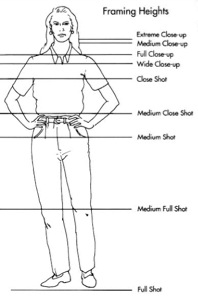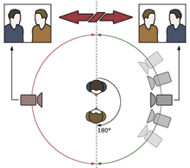How to
teach Media Language
Every medium has
its own ‘language’ – or combination of
languages – that it uses to communicate meaning.
Television, for example, uses verbal and written language
as well as the languages of moving images and sound. We
call these ‘languages’ because they use
familiar codes and conventions that are generally
understood.




We call
these ‘languages’ because they use familiar
codes and conventions that are generally understood.
Particular kinds of music or camera angles may be used
to signal particular emotions, for example; a page of a
newspaper or a sequence of shots in a film will be put
together using a certain kind of ‘grammar’.
By analysing these languages, we can come to a better
understanding of how media make
meaning.
Media messages are constructed using a creative language with its own rules. Each form of communication-- whether newspapers, TV game shows or horror movies-- has its own creative language: scary music heightens fear, camera close-ups convey intimacy, big headlines signal significance. Understanding the grammar, syntax and metaphor system of media language, especially the language of sounds and visuals which can reach beyond the rational to our deepest emotional core, increases our appreciation and enjoyment of media experiences as well as helps us to be less susceptible to manipulation.
Understanding how to "read" the media also means understanding that they are each art forms as well as information transmitters. We pay attention, in writing, to the well-crafted phrase, the vivid quote, the tightly structured argument. We appreciate editing that sharpens contrasts and makes our heart skip a beat in audio, video and film. We understand the power of a camera to shape our own point of view on entering a scene. When we see how media are constructed, we are able to judge their aesthetic value. We ask two sets of related questions: Did it entertain me, keep my attention, involve me - and how did it do that? Did it tell me more about the world, human affairs, and my part in it - and how did it do that?
Read some Examples for Students and a summary of the Key Questions
Media messages are constructed using a creative language with its own rules. Each form of communication-- whether newspapers, TV game shows or horror movies-- has its own creative language: scary music heightens fear, camera close-ups convey intimacy, big headlines signal significance. Understanding the grammar, syntax and metaphor system of media language, especially the language of sounds and visuals which can reach beyond the rational to our deepest emotional core, increases our appreciation and enjoyment of media experiences as well as helps us to be less susceptible to manipulation.
Understanding how to "read" the media also means understanding that they are each art forms as well as information transmitters. We pay attention, in writing, to the well-crafted phrase, the vivid quote, the tightly structured argument. We appreciate editing that sharpens contrasts and makes our heart skip a beat in audio, video and film. We understand the power of a camera to shape our own point of view on entering a scene. When we see how media are constructed, we are able to judge their aesthetic value. We ask two sets of related questions: Did it entertain me, keep my attention, involve me - and how did it do that? Did it tell me more about the world, human affairs, and my part in it - and how did it do that?
Read some Examples for Students and a summary of the Key Questions
- © 2003 Center for Media Literacy / www.medialit.org Literacy for the 21st Century / Orientation & Overview
- Patricia Aufderheide, General Principles in Media Literacy